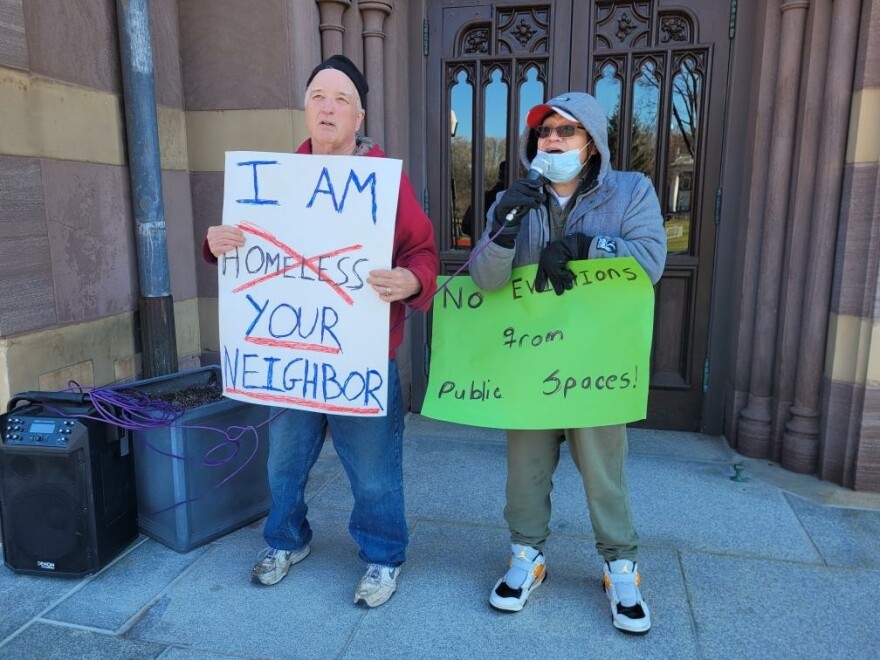A group of unhoused people and their allies in New Haven serve a hearty breakfast of pancakes, eggs and coffee in a little warming center on a recent Tuesday morning.
Mark Colville’s backyard is surrounded by the tents of about a dozen folks who have taken shelter there.
“Resources are plentiful in this city; plentiful enough for everyone to have a warm bed every night,” said Colville, of the Amistad Catholic Worker house in the city’s Hill neighborhood. “That’s not the reality.”
They are part of U-ACT, or the Unhoused Activist Community Team, consisting of people who are homeless and their supporters. They came up with a plan they want Mayor Justin Elicker to enact to provide safety and dignity for people who are homeless right now.

“Some of our demands are not to have anyone be removed from public land, at all, unless they have somewhere else to stay,” U-ACT volunteer Billy Bromage said. “Another demand is we want to have public restrooms available to everyone, including people who are unhoused, but everyone around the city, permanent bathrooms — not portapotties — that are open all the time, that are cleaned regularly, that are safe.”
The other two demands are access to showers and respect for people’s property, especially when their camps are dismantled. Free storage lockers downtown could even help people go about their days unencumbered by their worldly possessions.
U-ACT wants to get the city to legalize encampments and they have done their own research on possible locations, with help from researchers at Yale.
The group has been leafletting outside City Hall almost every Tuesday to build support for their campaign. Each weekly session ends with a hot lunch.

Tyrell Jackson has been unhoused in New Haven for the past two years. He lives in a tent encampment on Ella T. Grasso Boulevard and works with U-ACT. He said he appreciates the Amistad warming center and the hot food.
“You can scream a little bit louder when you’re a little bit warmer,” Jackson said. “You can spend the time standing holding a sign, marching, protesting, when your hands aren’t frostbitten. You can do a march when your stomach isn’t growling.”
Jackson is of two minds regarding the city’s response to homelessness.
“I know you can’t snap your fingers and magically funds and resources appear on the table, but I feel the effort has been extremely minimalistic,” he said. “[Although] I do like New Haven as far as the resources they do provide for the unhoused community.
“As a whole right now, even though it’s pretty jumbled and some things need work, it is still a night and day better idea to try to survive here in New Haven than to go somewhere else."
Mayor Justin Elicker said New Haven dedicates more money to homeless services from its general fund than any other municipality in the state, in addition to the state and federal money it receives. But he understands the differing views.
“Ultimately, I think that those two are not necessarily in conflict: that people can push us to do more, and those same people can ally with us and push others to do more than they’re doing now,” Elicker said.

Asked if some of the windfall from the American Rescue Plan could be put toward meeting U-ACT’s demands, he said it’s complicated.
“The short answer is yes, but the challenge here is that we need long-term funding for this," he said. "In the examples of both the bathrooms and showers, it’s not the cost of the construction that is significant, it’s the cost of the long-term maintenance."
Elicker noted the cost of daily operational maintenance — employing staff on-site to clean, keep secure and safe, particularly for 24/7 operations — is quite expensive.
He also maintains that while homelessness is not illegal, people should not camp on public property.
Back at his backyard warming center, Colville takes a different view.
“Until we have systemic change in this city, homelessness is a permanent reality," he said. "It’s time we had permanent solutions. And that begins with recognizing people’s human right to take refuge on public land."
Jackson even dreams of getting an abandoned building from the state that unhoused residents could fix up themselves, “and then just allow us to have that space."
"It’s just property sitting there anyway,” he said.
“That trickles down to other problems being solved: no overflows in the actual government centers that they’ve started, and we’re able to meet people where they’re at. So all these organizations are great, but they’re not us. They’re not in our situation.”
The group of U-ACT volunteers said they will continue building support among the unhoused, city departments and non-profits — to push the mayor until the reality is that everyone has a warm bed, every night.

